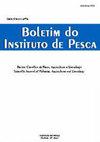PROTEIN HYDROLYSATE OF POULTRY BY-PRODUCT AND SWINE LIVER IN THE DIET OF PACIFIC WHITE SHRIMP
IF 0.6
4区 农林科学
Q4 FISHERIES
引用次数: 0
Abstract
This study aimed to evaluate the use of protein hydrolysate of poultry by-product and swine liver in the diet of Litopenaeus vannamei and its effect on the intestinal microbiota and on the enzymatic activity of the hepatopancreas. Shrimp (10.94 ± 0.90 g) were fed with diets containing 0%, 25%, 50%, 75% and 100% of replacement of salmon by-product meal by protein hydrolysate, in triplicate. The hepatopancreas enzymatic activity and composition of intestinal microbiota was studied. It was observed that the protein hydrolysate in the diet changed the enzymatic activity of the shrimp when compared to the control group (p < 0.05). Amylase activity increases directly with the percent of protein replacement in the diet. Metagenomic analysis revealed change in the gut biome of the shrimps. The increasing levels of protein replacement provided greater richness in the 75% and 100% treatments, were mainly related to changes in the abundances in the families Rhodobacteraceae and Flavobacteriaceae. A reduction in the abundance of the Vibrionaceae family was observed with the inclusion of protein hydrolysate in the diet. These results indicate that the protein hydrolysate demonstrated beneficial changes when added at concentrations of 25% in the diet of L. vannamei.太平洋白虾日粮中家禽副产物和猪肝的水解蛋白
本试验旨在研究禽副产物蛋白水解物和猪肝在凡纳滨对虾饲料中的应用及其对肠道菌群和肝胰脏酶活性的影响。试验对虾(10.94±0.90 g)分别投喂水解液蛋白替代鲑鱼副产物粉0%、25%、50%、75%和100%的饲料,共3个重复。研究了肝胰脏酶活性和肠道菌群组成。与对照组相比,饲粮中蛋白质水解物改变了对虾的酶活性(p < 0.05)。淀粉酶活性随饲料中蛋白质替代比例的增加而直接增加。宏基因组分析揭示了虾肠道生物群系的变化。蛋白质替代水平的提高在75%和100%处理下提供了更大的丰富度,主要与红杆菌科和黄杆菌科丰度的变化有关。在饲料中加入蛋白水解物后,观察到弧菌科菌的丰度降低。上述结果表明,在凡纳滨乳杆菌日粮中添加25%浓度的蛋白质水解物时,蛋白质水解物表现出有益的变化。
本文章由计算机程序翻译,如有差异,请以英文原文为准。
求助全文
约1分钟内获得全文
求助全文
来源期刊

Boletim do Instituto de Pesca
FISHERIES-ZOOLOGY
CiteScore
0.80
自引率
0.00%
发文量
24
审稿时长
>12 weeks
期刊介绍:
To publish original articles of research and short communications in the following áreas: Fisheries, Aquaculture, Zootechnology, Limnology, Oceanography, Biology and Pathology of aquatic organisms. The publication depends on the approval of the Editorial Board, based on the peer review.
 求助内容:
求助内容: 应助结果提醒方式:
应助结果提醒方式:


